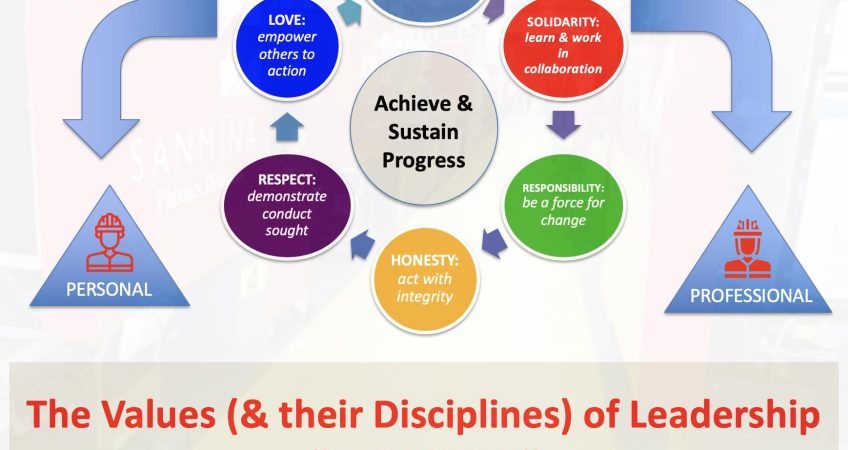
More Impact With Companies
 PSYDEH makes more impact with companies by working with USA-based PopSockets to produce our second factory worker training.
PSYDEH makes more impact with companies by working with USA-based PopSockets to produce our second factory worker training.
The Project
Building on our innovative 2020-2021 initiative with a factory in Tijuana, Mexico, PopSockets invited PSYDEH to work with their Wisconsin, USA partner factory in 2021-2022. This 12-month initiative revolved around a 4-month rights-based training of their partner Sanmina factory’s workers on effective leadership skills using PSYDEH’s leader values/disciplines methodology highlighted in figure 1.0. It has win elements for all stakeholders.
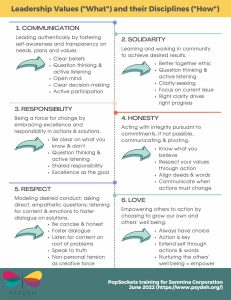
(1) PopSockets offers a valued service to Sanmina while advancing workers’ rights and meeting FLA requirements to engage with civil society.
(2) Sanmina invests in its workers with the aim of improving workplace feedback and open communication and, by extension, manufacturing operations at the production floor level.
(3) Sanmina workers develop the training and coaching systems they need to resolve conflicts, build community within teams, and improve worker-management communication channels
(4) PSYDEH advances its mission of empowering people to create their own sustainable impact while offering a quality service for pay.
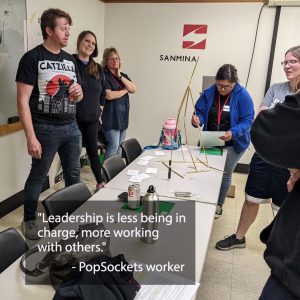
Outcomes
Benefits delivered were measured both quantitatively and qualitatively through a post-training survey and a series of workshop follow-up interviews.
Performance indicators focused on how well the project met three SMART objectives, which included (1) engaging 30-40 worker students in a 2-day training, (2) 85% of workers responding positively to training and/or claiming the experience enhanced feedback skills, and (3) improving Sanmina PopSockets’ production workers quality and efficiencies by 10% within 4 months of finishing the project.
Final reporting recorded 90-100% attainment of project objectives and included additional evaluation of qualitative indicators by worker-students, trainees, and comments from PSYDEH’s lead trainer and PopSockets and Sanmina project leads. Key conclusions included:
+ Students evidently began altering their behavior at the workplace in a positive manner as a direct result of the content of the training. Worker-students noted that the training changed the “quality of personal reflection about work” and that they had noticed perspectives shifting “from seeing situations as frustrations to seeing them as opportunities.”
+ PSYDEH lead trainer Katie Freund noted that students demonstrated a clear desire for increased training and capacity-building both during and after the training, as well as a “clear understanding of both the problems faced in their work environment and the unique solutions they could each contribute to begin to address them.”
+ Sanmina and PopSockets project leads also noted various project successes, including workers’ enthusiasm for training and increased opportunities for growth, as well as increased worker efficiencies of 7% at the time of final report writing in September 2022.
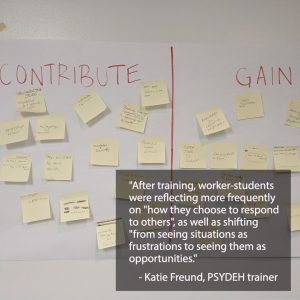 Project Significance
Project Significance
Our years-long partnership explained in this case study is a model for cross-border, public/private sector collaborations.
Mexican PSYDEH’s priority focus is our grassroots-focused, women-centric, community-led sustainable development work linking economic solidarity Red Sierra Madre and transformative digital inclusion Tec para Todos programming as a solution to Mexico’s inequality. But our methodology is built for all environments, including global companies like PopSockets and their factory partners. PSYDEH Senior Advisor Damon Taylor comments,
“This collaboration helps PSYDEH to expand our reach across the globe, showing how our unique leader values-based, adult leader empowerment methodology is as useful for the USA and Chinese worker (and her employer) as they are for rural Mexicans. It’s also a way for us to show others across the Global South how civil society can create a win-win partnership with the private sector, including helping us to cover flexible funding needs.”
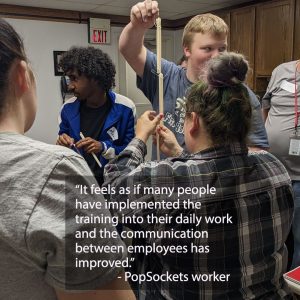 For Sanmina workers, the workshop was impactful, both for their work lives and personal lives. As worker-students stated in a follow-up check-in, “[i]t feels as if many people have implemented the training into their daily work and the communication between employees has improved.” Another worker student states post-training that they now see how, “[l]eadership is less being in charge, more working with others.”
For Sanmina workers, the workshop was impactful, both for their work lives and personal lives. As worker-students stated in a follow-up check-in, “[i]t feels as if many people have implemented the training into their daily work and the communication between employees has improved.” Another worker student states post-training that they now see how, “[l]eadership is less being in charge, more working with others.”
PopSockets agrees. Marissa Garcia, Director of Responsible Sourcing at the company, says that we might want to “[r]eplicate this kind of leadership training at Sanmina and other PopSockets’ factory partners. Such is demanded by workers and does, in fact, make an important measured impact on work quality and efficiency in the factory and in workers’ personal lives.” Moreover, in the future, Marissa comments on how we might want to
“[c]arve out project budget for activities focused on forging trusting relationships between worker students and trainer(s). The short-term success with human development-oriented training, especially with populations not often given said training, as well as the sustaining of this success, depends significantly on the existence of these trust-based relationships.”
Additional Information
PopSockets is a USA-based company with a global reach making grips, mounts, and wallets for digital devices. They work with the Fair Labor Association (FLA) to engage civil society in a variety of areas to improve working conditions in partner factories in Mexico, the USA, and China. The FLA creates lasting solutions to abusive labor practices by offering tools and resources to companies, delivering training to factory workers and management, conducting due diligence through independent assessments, and advocating for greater accountability and transparency.
